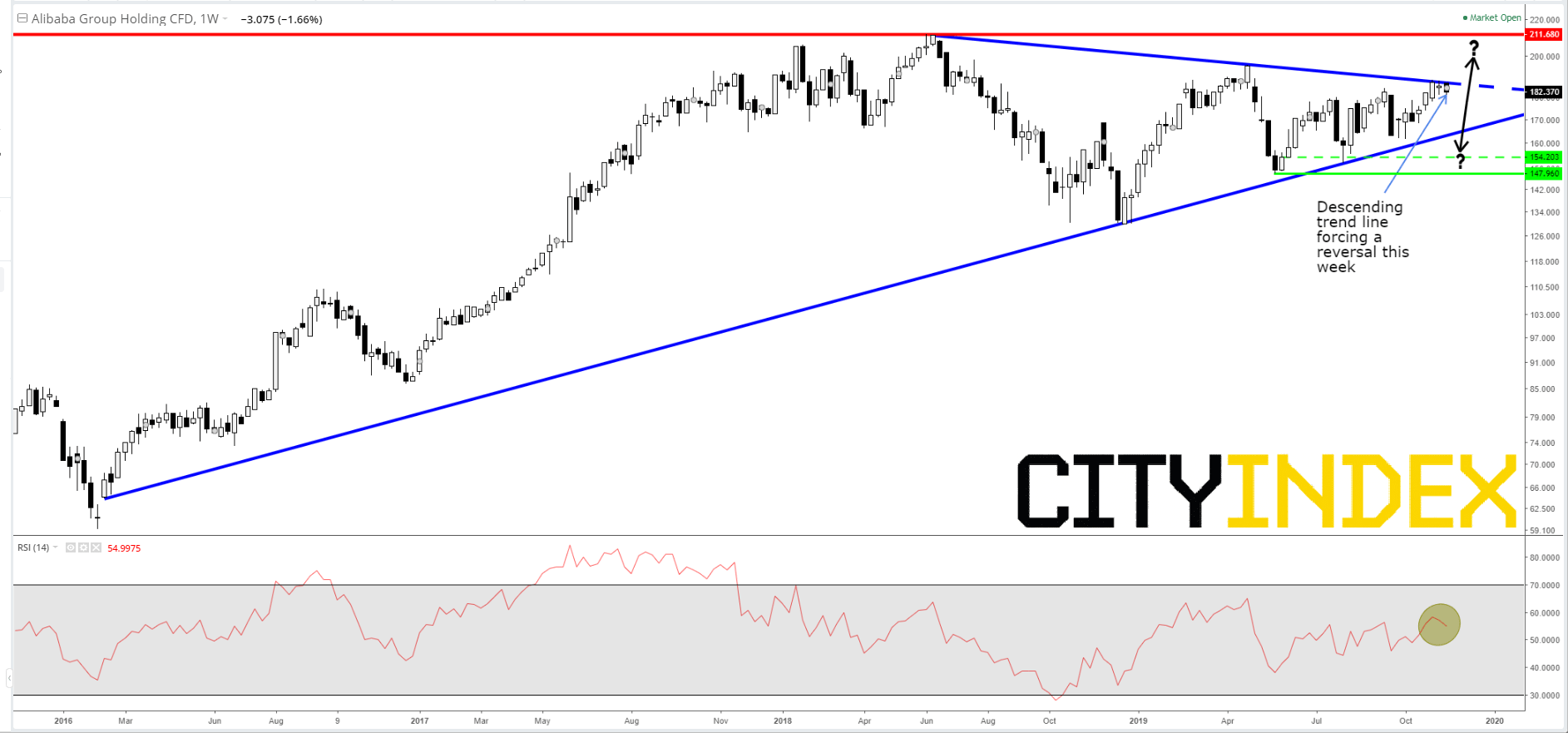The offer price kept falling but the sale still counts as a win
Alibaba Group Holding just got bigger. The mammoth e-commerce group’s U.S. listed stock was worth a total of about $477bn by Wednesday. $11bn now needs to be added to that after BABA raised around that amount in the off-exchange phase of its public offering in Hong Kong.
Key points
- 500 million shares sold at HK$176/share
- Gross proceeds: HK$88bn
- Both retail and institutional tranches of the offer oversubscribed, though by how much is unclear
- Shares will be eligible for short selling when public trade begins 26th November
The main theme throughout the listing process was evident again as stock was finally sold. The $11bn U.S. dollar amount raised was below the $12bn recently flagged. In turn, that compared with the $15bn Alibaba planned to raise when the sale was initially mooted. At HK$176/share, the offering was also the equivalent of some 3% below the previous close of Alibaba’s U.S. shares.
There’s no getting away from stock pressure implied by declining offers, though oversubscription should offset it, to some extent.
That Alibaba was prepared to expose existing shares to such risks, along with many others, winds back to the same key question. Why does the group need another listing that constitutes little more than 2% of its total market value? The answer is, of course, that it doesn’t. But the sale was still a smartly timed move.
Here are Alibaba’s key reasons for (re)launching in Hong Kong:
Cash for investments: The sale raises BABA’s cash pile to about $44bn. No other Internet-based company in the world has that much cash to spare. Alibaba said it plans to use share sale proceeds to drive user engagement, improve operational efficiency and fund continued innovation, though it provided no specifics. But as competition from groups like Tencent, JD.com and others mounts, options for strategic response are obvious. These include a deeper push into the south east Asia e-commerce market, where Tencent’s Shopee has made major inroads. Cloud computing is another front Alibaba seeks to confront Tencent, Baidu and other rivals, whilst the e-commerce leader also wants to stem the growth of Meituan Dianping in food delivery and travel, whilst buttressing beneficial network effects from a more coherent entertainment offer. Higher leeway for start-up investments that incubate talent, tech innovation and market share is always welcome.
Trade war echoes
As implications of the U.S.-China dispute have unfolded, including the potential for Washington to impose financial restrictions, Beijing has been trying to encourage global Chinese titans to list on mainland, though senior Alibaba executives have baulked. Hence, a HK listing is also a pragmatic compromise for the company that has benefitted from outright and tacit state facilitation, as well as relying heavily on Chinese consumers for huge revenues.
Well timed, long-term hedge
China’s cooling economy hasn’t slowed down Alibaba so far, which reported a 40% jump in revenue in the latest quarter with another record in its seemingly unstoppable 11th November Singles’ Day. This position of strength helped make the HK deal a compelling option for buyers and Hong Kong’s stock exchange. An $11bn listing –Hong Kong’s biggest since 2010—is quite an achievement for HKEX and Alibaba, given that the city remains roiled by unprecedented protests. The group thereby gets to add to its coffers with an eye for the years ahead, when conditions and timing may be less favourable.
Short-term boost
In the meantime, the share sale adds provides a much-needed short-term boost to sentiment, as global markets waver on the back of uncertain trade war prospects. Alibaba should be a rather obvious corporate beneficiary of any resolution. The stock currently trades at a 44% forward price/earnings premium to peers, compared to an average 83% premium over the past couple of years, according to Bloomberg data. A successful share may remind investors of BABA’s sheer brute force lead against competitors, including medium-term compounded sales growth of around 30.1% vs. 6.8% for close rivals.
Chart points
BABA is currently grappling with topside pressure as buyers gauge the strength of current momentum. The stock is coiling at the apex of this year’s wedge. The descending trend, validated in June, April and this week, is forcing a reversal. The downturn in weekly momentum (see RSI) is another negative mark against a successful break higher in the near term. More likely, the shares will now head to rising trend line support that’s theoretically been corroborated since 2016 and tagged last December. Any break below that line could hike volatility, though relatively close horizontal support ought to be considerable, especially at $147.96, the swing low in late-May. See detailed chart analysis by Chief Technical Strategist Kelvin Wong.
Alibaba Group Holding Ltd. (Nasdaq) CFD
Source: City Index






